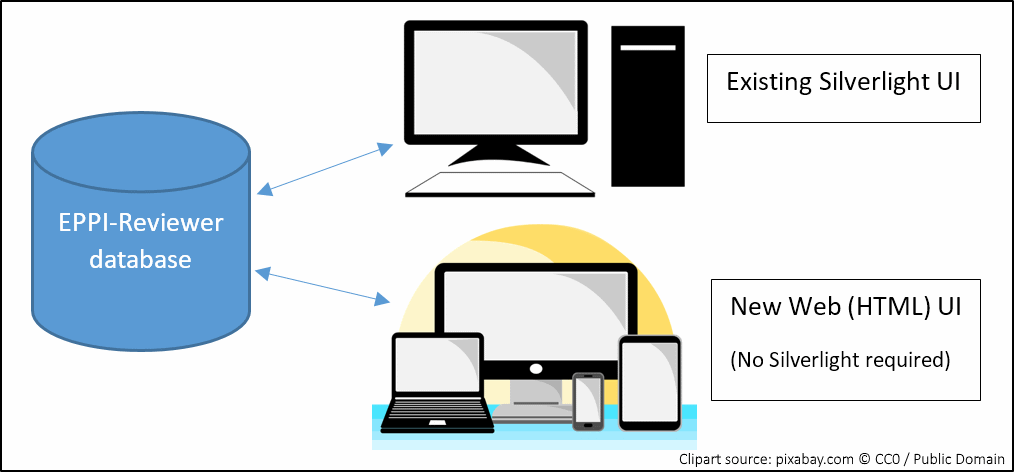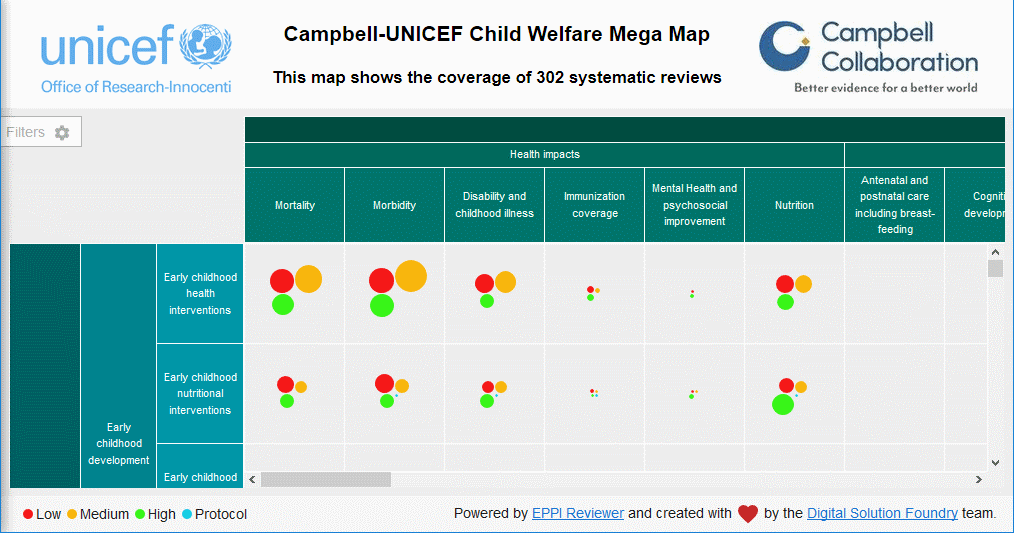EPPI-Reviewer is the software tool developed and used by those at the EPPI-Centre to conduct Systematic Reviews. It is also offered as a service for the wider Evidence Synthesis research community. At the same time, it plays a critical role in enabling methodological innovation. James Thomas and the EPPI-Reviewer team share an insight on their current development priorities as well as the general philosophy that drives their effort.
This is the first in a series of blogs about EPPI-Reviewer. We have many exciting developments in the pipeline and will use this blog to let you know about them over the next few months.
This blog piece sets the scene. It gives a little flavour of the development philosophy behind the software, and some of our current development priorities.
Development philosophy
EPPI-Reviewer grew out of a need within the EPPI-Centre for bespoke software to support its reviewing activity. We have always been interested in methodological innovation and needed a tool that would support this. We also conduct systematic reviews in a wide range of subject areas and using a range of different types of research. We therefore needed a flexible tool that could support the breadth of reviews that we undertook. We were not the only people who needed such a tool, and as requests came in for other people to use the software, we developed what is now the EPPI-Reviewer service. The current version of EPPI-Reviewer (version 4) first went online in 2010, and we have extended its functionality substantially since. (For those of you interested in history, EPPI-Reviewer began as a desktop application in 1993 called ‘EPIC’ and first went online as a service to people outside the EPPI-Centre in the late 1990s.)
So, EPPI-Reviewer is designed from the bottom up to be a flexible research tool that supports a range of methodologies – and also methodological innovation. The development team is in close contact with colleagues conducting reviews (in the same small building as many) so we have been able to extend and modify the software in response to reviewer need. For example, it contains the widest range of automation functionality of any systematic review tool (supporting ‘priority screening’ for efficient citation screening, with three high performing study-type classifiers, the ability to ‘make your own’ machine learning classifier, and text clustering tools); it supports meta-analysis, meta-regression and network meta-analysis using packages in the ‘R’ statistical environment, as well as ‘line-by-line coding’ for qualitative evidence synthesis. Packing such a large range of functions into a single application is challenging of course, and we have prioritised functionality over providing a smooth ‘workflow’ model, where reviewers are expected to follow a specific path.
Current technology challenges
EPPI-Reviewer version 4 runs in the Microsoft Silverlight browser plugin. This provided a ‘desktop-like’ application experience in a web browser across the Windows and OSX operating systems. The demise of such plugins and the rise of diverse mobile devices has led to a rapid development effort. We launched the first version of a new user interface last month: a tool which mimics the ‘coding only’ functionality that you may be familiar with. This enables users to do screening and data extraction in any web browser without the Silverlight plugin.
Currently, it is necessary to do the review setup and analysis phases using the Silverlight version (for practical guidance re Silverlight, please see here), so we are now extending our new user interface to support these processes too – and hope to have most of the essentials covered by Christmas. The figure below shows how, in the meantime, we will have two different user interfaces interacting with the same database. This means that you can log in using either user interface and work on exactly the same review.

New and upcoming developments
We have partnered with the Campbell Collaboration to produce a user interface – based on the EPPI-Reviewer database – for ‘mapping’ research activity. These maps provide a user-friendly way of presenting the extent and nature of research in a broad domain. The columns and rows in the example below are defined in EPPI-Reviewer as ‘codes’ and the circles indicate the quantity and quality of evidence in each cell.

We are also designing some new data services as application programming interfaces (APIs) that a range of different applications can use. These data services are built on large sets of data and incorporate the latest automation tools to enable users to locate relevant research quickly. These services are looking forward to a world of ‘living’ systematic reviews (which we have written about elsewhere) where we keep reviews updated with new evidence as soon as it becomes available. We are planning to extend our support for ‘maps’ to include creating automatically updated maps in due course. Dealing with large amounts of data poses significant technical challenges, but being researchers, we are also busy evaluating the strengths and weaknesses of underpinning reviews with new data services. When we make these services available, we will also need to publish robust evaluations to support their use.
What about EPPI-Reviewer Version 5?
As some of you may know, we have been partnering with NICE to develop a new version of EPPI-Reviewer. The software is now being rolled out internally at NICE, but is currently more attuned to NICE’s needs than other external users, so we are concentrating our immediate development effort on giving our users an alternative entry point into the existing EPPI-Reviewer database. This strategy also gives users a seamless migration from one user interface into the other.
Conclusion
As this brief post indicates, this is a busy and exciting period of development here at the EPPI-Centre. We are always busy making progress on multiple fronts, so to make sure we can rapidly adapt our plans as and when we discover what works best for us and our whole community. As always, this means that feedback received via the forums and email is highly appreciated. As we move forward we will post further updates. Please do get in touch if you have any questions or feedback.
The EPPI-Reviewer Core team
The EPPI-Reviewer core team is small, agile and tight. The main members are listed below, in order of appearance. This list does not include the numerous people in the EPPI-Centre and beyond, who on occasion provide suggestions, advice and/or specialised contributions – this other list would be much, much longer!
James Thomas is the team leader and scientific director – he wrote the very first version(s) of EPPI-Reviewer and produces the prototypes of most new/innovative features of EPPI-Reviewer. James also leads the methodological-evaluation efforts that normally precede making any new methodology available to the larger community.
Jeff Brunton oversees user support and licensing. He is the lead developer for the Account Manager, the Web-Databases applications, RIS export and directed the development of the new mapping tool – along with James, he wrote EPPI-Reviewer version 3. He is also responsible for Testing and User Experience.
Sergio Graziosi spends most of his time inside the EPPI-Reviewer code. He brings James’ prototypes to production and makes sure all nuts and bolts are tightened up, while mechanisms (including systems) are well oiled. Along with Patrick, he wrote the first version of the (non-Silverlight) coding App.
Zak Ghouze provides user support and looks after our numerous systems. He is also consulting in designing the shape and feel of the new interface as well as providing invaluable insight into the minds of EPPI-Reviewer users. Along with Jeff, he is shaping the User Experience of our latest developments.
Patrick O’Driscoll writes code for all occasions. He brings fresh ideas to the team by means of new and varied experience on Web-Based front-ends as well as vast array of technologies and development methodologies. Together with Sergio, he is now busy writing the new web-based application.